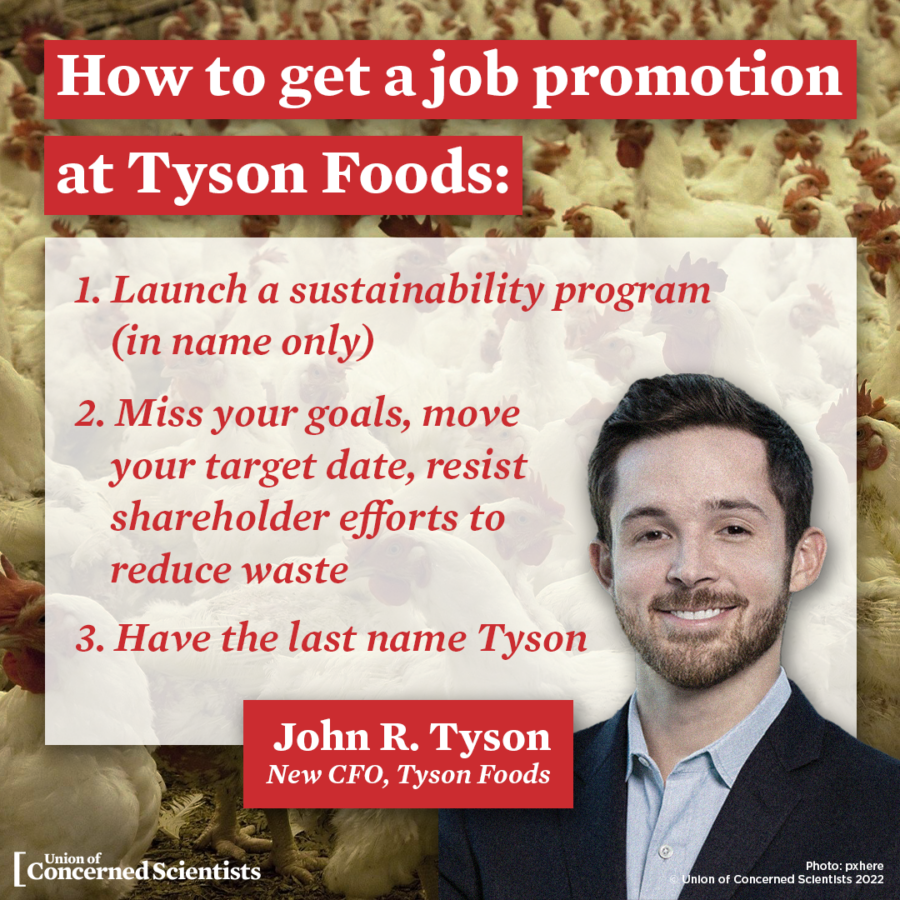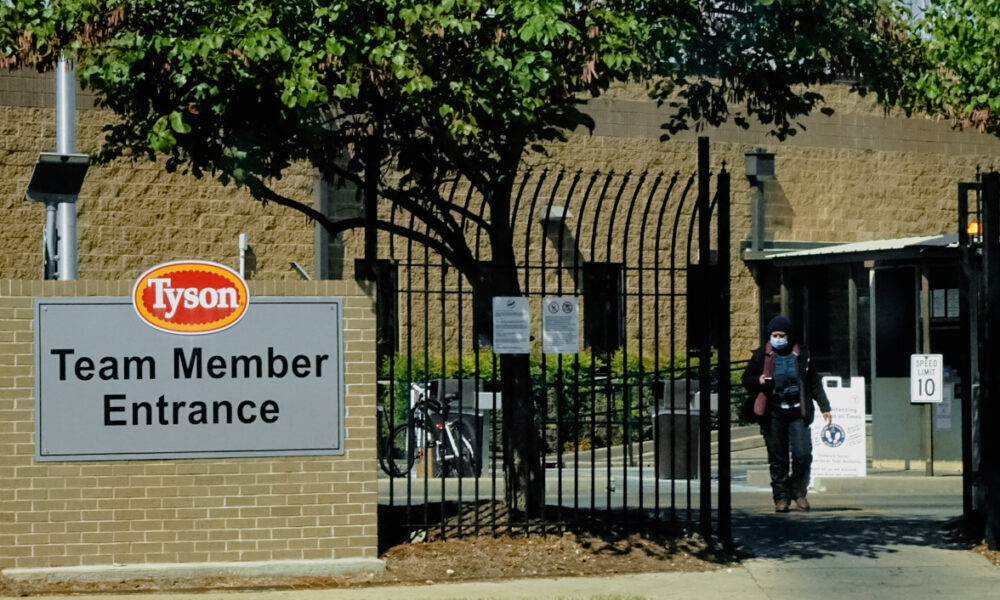In a remarkable display of nepotism, meat and poultry giant and “family business” Tyson Foods recently promoted the 32-year-old son of its chairman to the position of chief financial officer (CFO), making him the youngest CFO of a Fortune 500 company. It’s a job that commands a seven-figure salary-and-bonus package and puts the inexperienced young scion in charge of the meat conglomerate’s finances. And it comes on the heels of a decidedly less-than-stellar track record in his previous job at Tyson.
The promotion of John R. Tyson in October has raised eyebrows among corporate governance experts and the business-friendly Wall Street Journal, which pointed out potential conflicts of interest, including whether the company’s board—again, chaired by a guy he calls “Dad”—will hold him accountable for his performance. John R. Tyson is a great-grandson of the company’s founder, and both his father and his aunt sit on the board.
The new title comes with a big pay raise. The Wall Street Journal reports that the younger Tyson will receive an annual base salary of $650,000 and an increase in his target annual incentive payment from 90 percent to 110 percent of his annual base salary. The previous CFO’s total compensation package in 2021 exceeded $5.2 million.
So how exactly did John R. Tyson land such a big job? And what is his track record since joining the family business?
If at first you don’t succeed . . . move up!
According to his official bio and his LinkedIn profile, John R. Tyson joined Tyson Foods in 2019 as executive vice president for strategy and chief sustainability officer. With an MBA degree and previous work experience in investment banking and as a private equity and venture capital investor, it’s not clear he had any particular qualification to head up sustainability. More likely, it was just a good place to begin his climb up the corporate ladder.
As chief sustainability officer, he inherited a public pledge, made a year before he arrived on the scene, to shift 2 million acres of cropland to more sustainable practices by 2020. Even though that acreage is just 20 percent of the company’s total farmland footprint, Tyson (the company and the person) hasn’t followed through. As of 2021, Tyson Foods had enrolled a mere fraction of this acreage into a pilot program, and it is unclear how sustainable the management of that fraction really is. Meanwhile, the company has punted the original 2-million-acre commitment to 2025.
Moreover, at the last Tyson Foods shareholder meeting, the Tyson-family-dominated board beat back a resolution calling on the company to study its use of plastic packaging, another important sustainability issue. Around the same time, a Ceres report showed that big meat processors, including Tyson, lag behind other food companies on sustainable water use. And just this week, another new analysis shows that the livestock in Tyson Foods’ supply chain produce as much methane (a potent heat-trapping gas driving climate change) as the entire country of Russia.
Judging by the company’s sustainability performance under the Tyson heir’s leadership, he didn’t exactly do a bang-up job before moving up to the C-suite. Nowhere else could you fail so hard and get a big juicy promotion. Moreover, as Investopedia notes, the CFO position in a big corporation is generally reserved for “very experienced professionals with established track records in their field.”
But this is Tyson Foods.

What can we expect next?
So now Junior is directly in charge of managing Tyson’s finances—no small task given the company’s $53 billion in sales in fiscal year 2022. But in a startling display of immaturity, just a month into his tenure as CFO, John R. Tyson was arrested for public intoxication and criminal trespassing after being found by a woman he reportedly didn’t know, passed out in a bed of her Fayetteville, Arkansas, home. He has apologized to Tyson employees and says he’s seeking treatment, but the incident has raised concerns about nepotism and its impacts—would anyone in a similar situation not named Tyson still be on the job? One corporate governance expert called this “a critical moment” for Tyson Foods, warning, “This lapse of judgment cannot be tolerated for such a serious job.” And the new CFO’s first quarterly earnings call with financial analysts and journalists this week was a doozy.
Earlier this year, Fortune magazine named Tyson Foods the world’s most admired food company for a sixth year running. The improbable designation is the result of an annual survey of “top executives, directors and financial analysts,” who apparently are not troubled by a business model that exploits and endangers workers, cheats farmers and consumers, influences an amount of farmland twice the size of New Jersey, and makes empty sustainability promises at a time when “sustainability” literally means survival on this planet. Because profits, I guess.
For all its pledges and promises, Tyson Foods is showing us that it doesn’t take sustainability seriously. Instead, it treats it as a pet project for grooming young executives, with no real accountability, transparency, or openness to shareholder concerns. Going forward, John R. Tyson will maintain responsibility for sustainability in addition to his new gig. How much can we expect a new, apparently in-over-his-head CFO to focus on sustainability?
Even if he tries to carve out time for it, sustainability at Tyson will be an add-on, an afterthought, an extracurricular, instead of the priority it must be if a food company wants to remain profitable. And if we all want to continue to eat.

